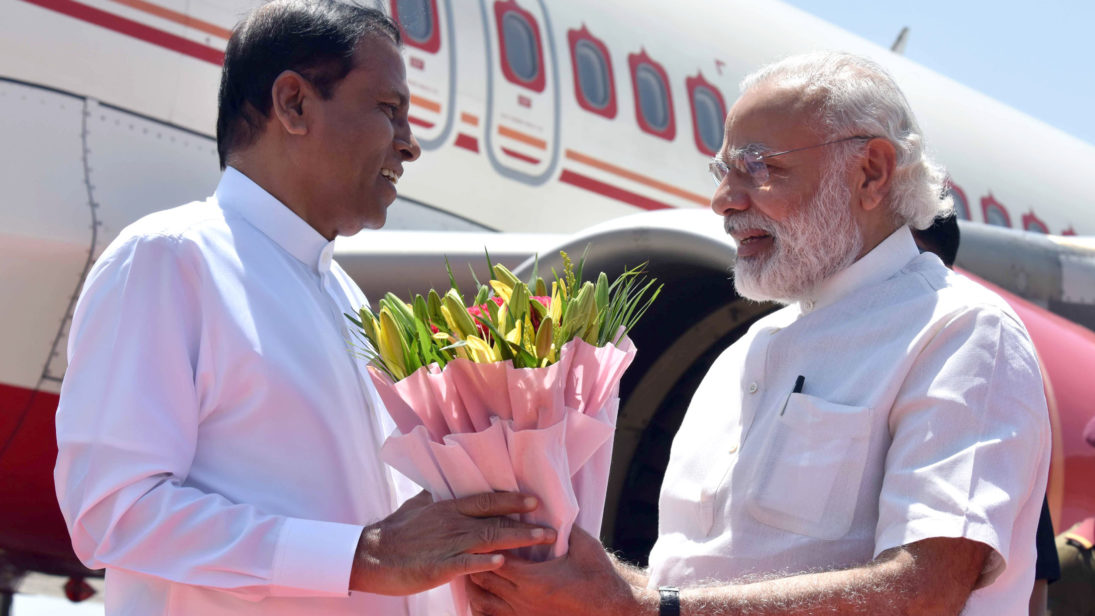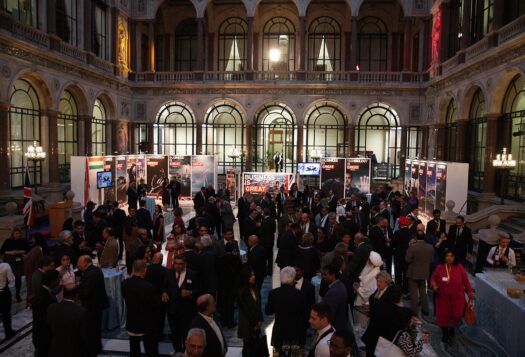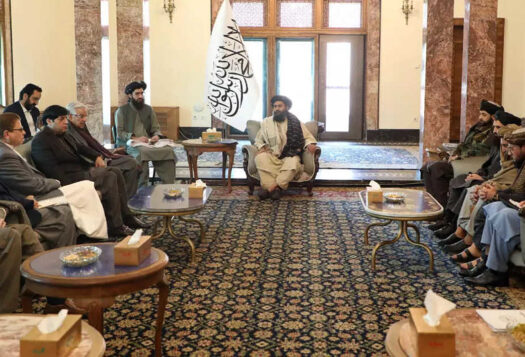
Prime Minister Narendra Modi’s visit to Colombo to participate in the International Day of Vesak festivities is a gesture to convey that India aims to strengthen bilateral ties with Sri Lanka. Under the new Sirisena and Wickramasinghe regime, Sri Lanka’s foreign policy is shifting towards a more internationally inclusive posture, and India has responded positively. While the recent bonhomie between India and Sri Lanka may signal that the two countries are turning over a new leaf, the strengthening of the bilateral will introduce new religious, economic, and regional challenges.
Post-2015 Sri Lanka is forward-looking regarding bilateral relations with India. The country’s foreign policy has shifted from a pro-China stance under the Rajapaksa regime to a more inclusive one. While Modi has primarily oriented India’s relations with Sri Lanka around economic development, Sri Lanka embraced the Indian prime minister after he clearly stated that India supports a “united” Sri Lanka, which is exactly what Sri Lanka wanted to hear regarding the most contentious issue in the country–the ethnic conflict. This positive stance has given a boost to the relationship, especially since the victory of President Sirisena who openly declared during his 2015 presidential campaign that he would change the pro-China foreign policy championed by Rajapaksa. As a result, Sri Lanka’s contemporary foreign policy has shifted dramatically from an isolationist and pro-China stance to a more inclusive, autonomous but interdependent approach. This seems to have made India more comfortable with Sri Lanka in its quest to remain powerful in the Indian Ocean. Modi’s upcoming visit can be considered an indication of India’s positive response to Sri Lanka’s shift towards a non-aligned or middle-path foreign policy, which seeks an active Indian role not only in economic and trade related activities but also in religious and cultural matters.
Recent bilateral visits – including Modi’s first visit to Sri Lanka in 2015, Sirisena’s first and second visits to India in 2015 and 2016, and Wickramasinghe’s visit to India in 2016 – included fruitful discussions on trade and commerce and restored goodwill between the two countries. The landmark agreement on cooperation in the peaceful uses of nuclear energy was the first of its kind for Sri Lanka. However, Modi’s upcoming visit to Sri Lanka to celebrate the most important day for Buddhists around the world may be a particularly bold step for his administration. The West has typically viewed Sri Lanka as favoring Buddhism and not prioritizing the concerns of minorities such as Tamils and Muslims. In such a scenario, Modi’s visit could be interpreted as condoning Sri Lanka’s behavior and accepting the preponderance of the Buddhist majority in the island nation. Considering Modi’s Hindu nationalistic stance, this could also imply that India sees Sri Lanka’s Buddhist favoritism as being in line with India’s own interests. This has brought a cultural and religious dimension to India-Sri Lanka relations.
Though the religious and cultural dimensions seem to be at the forefront with regard to Modi’s visit, discussions of trade and development, specifically the MoU on infrastructure development and the Economic and Technology Cooperation Agreement (ETCA), are likely to be on the agenda. Palk Bay fisheries conflicts could also come up. Not all forms of Indian involvement have been welcomed by the people of Sri Lanka, and closer ties could give rise to more domestic opposition. The ETCA has already become a controversial issue in Sri Lanka, as some fear that this agreement could create “financial/monetary instability” in the future. The worry is that the deal will lower standards in sectors such as information technology (IT) and healthcare by allowing India to seize opportunities from the local talent. Both countries also have yet to resolve issues related to the Free Trade Agreement agreed upon in early 2000.
India and Sri Lanka still suffer from a lack of trust, rooted in history. It is hard for Colombo to forget India’s violation of its sovereignty when it invaded in 1987. To add to that, the India-China rivalry puts Sri Lanka in a difficult position. Prime Minister Wickremasinghe expressed interest in remaining a key maritime point for China in the Indian Ocean and voiced support for the One Belt, One Road (OBOR) initiative. India’s fear of China’s growing influence in the Indian Ocean has led it to reject the invitation to join OBOR, which could complicate India-Sri Lanka ties. Sensing the need to balance relations between China and India, Sri Lanka has offered to explore developing the eastern Trincomalee harbor with India, which could be discussed during Modi’s visit. Sri Lanka wants to enhance relations with India at a multi-dimensional level, creating opportunities for India to invest in the Tamil-dominated north and east, while at the same time reaping the benefits of OBOR indirectly.
Bilateral relations between India and Sri Lanka have been moving in a positive direction under the new regime. Economic and development cooperation has advanced as Sri Lanka has invited India to invest in infrastructure development in the north and east. However, the two countries will face challenges down the road. Most notable is the China factor, which is still a source of tension between the two and will likely grow as India-Sri Lanka ties strengthen. Nevertheless, Modi’s upcoming visit is a symbol of goodwill and it will help build trust in the relationship.
***
Images: Press Information Bureau, India


